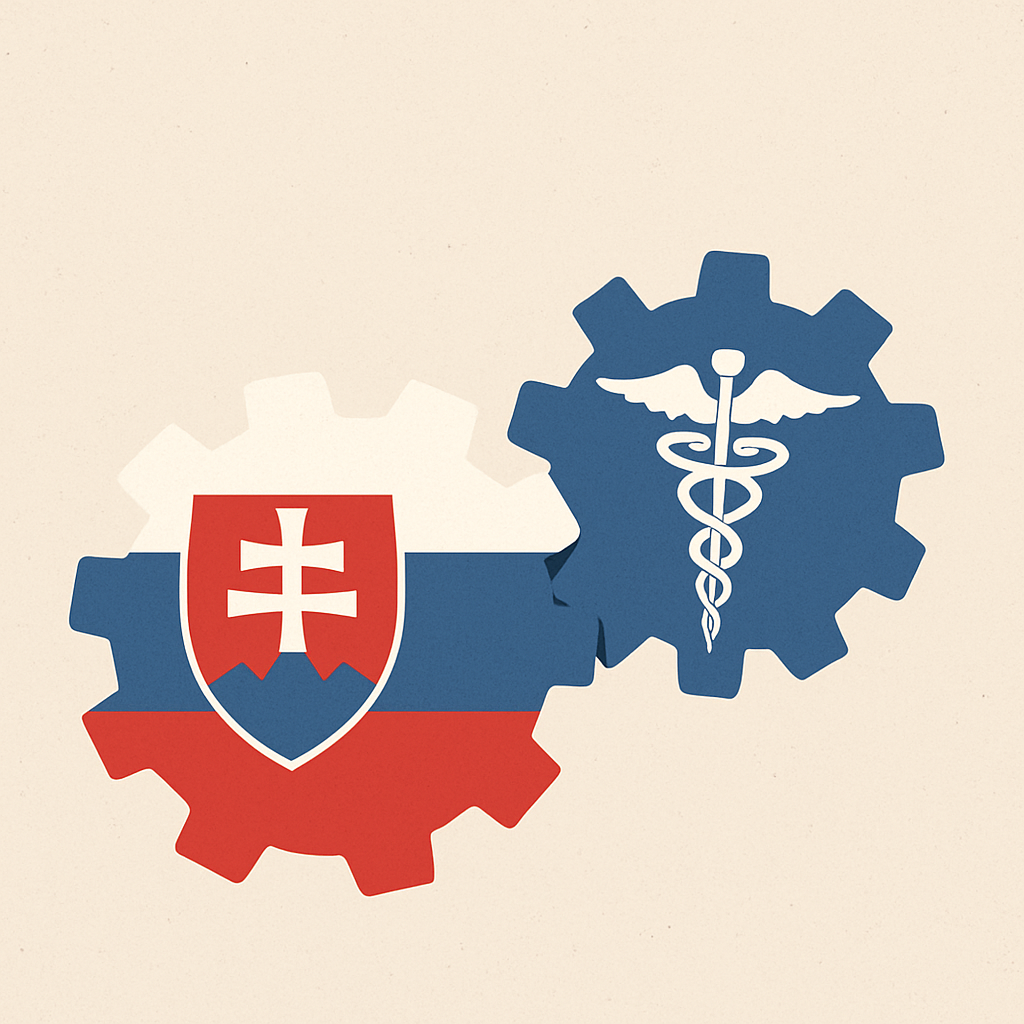Foreign Medical Professionals in Slovakia: Three Key Takeaways from Official Data
High Interest — Low Success: The Complementary Attestation Remains a Significant Barrier
According to official data from Slovakia’s Ministry of Health and Ministry of Education, the complementary attestation exam (tzv. doplňujúca skúška) required for recognizing foreign medical qualifications remains a major hurdle. In 2023, 41 foreign pharmacists attempted the exam, but only 11 passed — a success rate of under 27%. The situation is even more concerning among dentists: only 45 of 353 attempts were successful. Even among medical doctors, the pass rate does not exceed 42%. This highlights serious academic or language barriers, insufficient preparation, or a lack of system adaptation to the needs of foreign candidates.
According to official data from Slovakia’s Ministry of Health and Ministry of Education, the complementary attestation exam (tzv. doplňujúca skúška) required for recognizing foreign medical qualifications remains a major hurdle. In 2023, 41 foreign pharmacists attempted the exam, but only 11 passed — a success rate of under 27%. The situation is even more concerning among dentists: only 45 of 353 attempts were successful. Even among medical doctors, the pass rate does not exceed 42%. This highlights serious academic or language barriers, insufficient preparation, or a lack of system adaptation to the needs of foreign candidates.
Ukraine — the Primary Source of Medical Migration to Slovakia
Between 2022 and 2025, Slovakia accepted 596 temporary healthcare trainees, 541 of whom were Ukrainian citizens. Similarly, the majority of recognized diplomas for the complementary attestation exam also came from Ukraine: 230 doctors in 2022, 204 in 2023, and 153 in 2024. Ukraine remains the dominant source of qualified medical professionals, especially in the context of the ongoing war. However, the low pass rates for attestation highlight a missed opportunity to fully utilize this valuable human resource.
Special attention should be given to the situation of practicing nurses and medical assistants. In 2022, 25 out of 26 candidates passed the *doplňujúca skúška* (96% success rate), and in 2023, 121 out of 131 (92%). This is an outstanding result, particularly compared to other medical professions. It clearly shows that, with proper preparation and a fair recognition process, foreign-trained professionals—especially nurses—can integrate quickly and effectively into Slovakia’s healthcare system. This trend is already developing: between 2022 and 2024, a total of 377 nurses, mostly from Ukraine, had their education formally recognized.
These figures demonstrate that in the field of nursing, Slovakia is already taking concrete and successful steps toward workforce integration. It is crucial to maintain and expand this progress—particularly in light of the ongoing shortage of more than 2,600 nurses in the national healthcare system.
Between 2022 and 2025, Slovakia accepted 596 temporary healthcare trainees, 541 of whom were Ukrainian citizens. Similarly, the majority of recognized diplomas for the complementary attestation exam also came from Ukraine: 230 doctors in 2022, 204 in 2023, and 153 in 2024. Ukraine remains the dominant source of qualified medical professionals, especially in the context of the ongoing war. However, the low pass rates for attestation highlight a missed opportunity to fully utilize this valuable human resource.
Special attention should be given to the situation of practicing nurses and medical assistants. In 2022, 25 out of 26 candidates passed the *doplňujúca skúška* (96% success rate), and in 2023, 121 out of 131 (92%). This is an outstanding result, particularly compared to other medical professions. It clearly shows that, with proper preparation and a fair recognition process, foreign-trained professionals—especially nurses—can integrate quickly and effectively into Slovakia’s healthcare system. This trend is already developing: between 2022 and 2024, a total of 377 nurses, mostly from Ukraine, had their education formally recognized.
These figures demonstrate that in the field of nursing, Slovakia is already taking concrete and successful steps toward workforce integration. It is crucial to maintain and expand this progress—particularly in light of the ongoing shortage of more than 2,600 nurses in the national healthcare system.
Slovakia Needs Medical Personnel — But Is It Ready to Welcome Them?
According to the latest assessment report from the Ministry of Health, Slovakia is currently short 1,744 doctors, 2,605 nurses, and 24 dentists (data for 2023–2024). Nevertheless, significant barriers to recognizing foreign diplomas and passing the complementary exams continue to limit the effective integration of foreign professionals into the healthcare system. The core issue is not a shortage of specialists, but rather the inefficiency of the mechanisms meant to integrate them into Slovakia’s national healthcare structure.
According to the latest assessment report from the Ministry of Health, Slovakia is currently short 1,744 doctors, 2,605 nurses, and 24 dentists (data for 2023–2024). Nevertheless, significant barriers to recognizing foreign diplomas and passing the complementary exams continue to limit the effective integration of foreign professionals into the healthcare system. The core issue is not a shortage of specialists, but rather the inefficiency of the mechanisms meant to integrate them into Slovakia’s national healthcare structure.
How Slovakia Can Better Integrate Foreign Medical Professionals into Its Healthcare System
Some Steps Have Already Been Taken:
Temporary licensing (tzv. dočasná odborná stáž) has allowed more than 500 professionals from Ukraine to work within Slovakia’s healthcare system since 2022.
The diploma recognition process has been partially transferred to the digital environment, but it remains fragmented and inconsistent across institutions.
However, to enable full and effective integration of foreign professionals—especially amid the growing workforce shortage—Slovakia needs to go further.
Temporary licensing (tzv. dočasná odborná stáž) has allowed more than 500 professionals from Ukraine to work within Slovakia’s healthcare system since 2022.
The diploma recognition process has been partially transferred to the digital environment, but it remains fragmented and inconsistent across institutions.
However, to enable full and effective integration of foreign professionals—especially amid the growing workforce shortage—Slovakia needs to go further.
Preparatory Programs for the Doplňujúca Skúška — A Strategically Important Resource
One of the main reasons for the low pass rate on the complementary attestation exam is the insufficient preparation of foreign medical professionals. The lack of comprehensive pre-exam support is especially acute.
What could make a difference:
Such solutions are already partially being implemented through private initiatives. For instance, the Slovak educational platform Med-Integro, which focuses on the smooth and fast integration of foreign medical professionals, currently offers language courses and learning modules to prepare for the skúška. The company plans to expand its offerings with exam simulations, video breakdowns of common mistakes, and expert guidance.
This promising direction could form the basis for partnerships with universities and public institutions — and become a scalable model for improving foreign medical integration on a national level.
One of the main reasons for the low pass rate on the complementary attestation exam is the insufficient preparation of foreign medical professionals. The lack of comprehensive pre-exam support is especially acute.
What could make a difference:
- Intensive courses in medical Slovak,
- Webinars explaining the exam structure,
- Adapted learning materials focusing on local medical standards,
- Practice tests and oral exam simulations with expert feedback.
Such solutions are already partially being implemented through private initiatives. For instance, the Slovak educational platform Med-Integro, which focuses on the smooth and fast integration of foreign medical professionals, currently offers language courses and learning modules to prepare for the skúška. The company plans to expand its offerings with exam simulations, video breakdowns of common mistakes, and expert guidance.
This promising direction could form the basis for partnerships with universities and public institutions — and become a scalable model for improving foreign medical integration on a national level.
Appointment of Integration Coordinators in Medical Institutions
Designated coordinators (e.g., mentori pre integráciu) can play a key role in supporting foreign medical professionals throughout their adaptation process — from administrative procedures to integration within the workplace team. This practice not only reduces staff turnover but also significantly accelerates professional adjustment and long-term retention.
Designated coordinators (e.g., mentori pre integráciu) can play a key role in supporting foreign medical professionals throughout their adaptation process — from administrative procedures to integration within the workplace team. This practice not only reduces staff turnover but also significantly accelerates professional adjustment and long-term retention.
Introduction of Bridge Programs — Clinical Courses Before the Exam
Bridge programs (lasting 3–6 months), which combine clinical practice with language support, have already proven successful in countries like Germany. These programs serve as a natural bridge between diploma recognition and successful exam completion, allowing foreign professionals not only to study theory, but also to gain hands-on experience under supervision in real medical settings.
Bridge programs (lasting 3–6 months), which combine clinical practice with language support, have already proven successful in countries like Germany. These programs serve as a natural bridge between diploma recognition and successful exam completion, allowing foreign professionals not only to study theory, but also to gain hands-on experience under supervision in real medical settings.
Time to Unite Our Efforts
Slovakia’s healthcare system faces a serious staffing shortage, and under such conditions, losing well-trained professionals due to language, academic, or administrative barriers is a luxury it cannot afford. Real solutions require a systemic approach and coordinated action — involving ministries, universities, hospitals, private initiatives, and the foreign medical professionals themselves.
The MALnS community believes in the power of collective action. Only through joint efforts can we build an effective and humane system for qualification recognition and professional integration. We welcome all initiatives that make the path to integration clearer, fairer, and more accessible.
One such example is the educational platform Med-Integro, which offers language and exam preparation tailored for foreign-trained medical professionals. Courses, modules, webinars, and mock exams are practical tools that can become part of a comprehensive solution — complementing the efforts of public and academic institutions.
We invite all stakeholders to engage in dialogue and collaboration — for a more inclusive, accessible, and resilient healthcare system in Slovakia.
The MALnS community believes in the power of collective action. Only through joint efforts can we build an effective and humane system for qualification recognition and professional integration. We welcome all initiatives that make the path to integration clearer, fairer, and more accessible.
One such example is the educational platform Med-Integro, which offers language and exam preparation tailored for foreign-trained medical professionals. Courses, modules, webinars, and mock exams are practical tools that can become part of a comprehensive solution — complementing the efforts of public and academic institutions.
We invite all stakeholders to engage in dialogue and collaboration — for a more inclusive, accessible, and resilient healthcare system in Slovakia.





